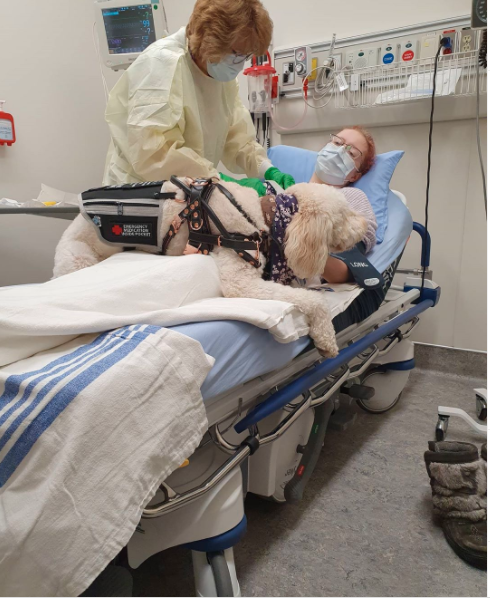What it's like to be immunocompromised during the COVID-19 outbreak
This is the frightening reality of what life is like for those who are immunocompromised during the COVID-19 pandemic.
Paige Noelck, from Alberta in the US, lives with postural orthostatic tachycardia syndrome (POTS), an autonomic nervous system abnormality that affects blood flow.
The debilitating condition causes lightheadedness, fainting and rapid heart rate, due to the body’s inability to maintain a steady blood pressure.

The 24-year-old apprentice service dog trainer must visit a hospital every five days to receive a combination of lactate and saline through IV therapy to help treat her condition.
On March 16, Noelck went for her appointment with her friend, Gabby, despite having a sore throat, fever cough, exhaustion and experiencing shortness of breath for several days prior.
Due to the nature of her symptoms Noelck and Gabby were put into isolation and tested for COVID-19.
Noelck chronicled the experience on social media, and told followers that she had been so exhausted prior to her appointment that she “couldn’t even be awake for 10 minutes at a time” without falling back asleep.
Noelck said she was experiencing tachycardia at the hospital, with a heart rate of 140 beats per minute, and after her regular IV treatment, doctors gave her an additional two litres of fluids — but her heart rate was still high, around the mid 100s.
She was swabbed for COVID-19, but due to the high volume of tests, she was informed it would be up to five days before she received her results, instead of the typical 24 hour period.
Although she remained in isolation with her fiancé, who is experiencing similar symptoms and her service dog, Stitch. In an update to social media, Noelck said she was doing “OK” but still felt “extremely exhausted.”
“I have the symptoms of a chest cold, with a sore throat and slight cough. Besides the exhaustion it's just feels like I have a cold,” she wrote.
“Stitch, is already getting stir crazy being in the house, I hope I have enough energy to do some training with her today to try and mentally tire her out.”
On March 18, Noelck received word that her swab tested negative for COVID-19, but she must remain in isolation until she recovers from her illness.
Once she feels well enough, she will have to practice social distancing and wear a face mask to avoid contracting the virus.
In an interview with the Toronto Star, Noelck said that while a common cold can be an inconvenience for most people, it can be life threatening for someone immunocompromised.
As someone considered high-risk, she said she is frustrated by both the people who are panicking and hoarding supplies, and those who aren’t taking the virus seriously.
“I feel like people are panicking too much,” she said. While Health Canada has advised that only people who are immunocompromised and considered high risk need to wear face masks, there has been a shortage of supply since the virus outbreak. The type mask that Noelck wears daily during cold and flu season is back-ordered until June. “You don’t need a mask if you’re not immunocompromised.”
On the other hand, she wishes that more people would practice social distancing. On St. Patrick’s Day, she became frustrated when she saw photos of people gathered in large crowds.
For Noelck, like many people who are immunocompromised, self-isolation and social distancing is nothing new — it’s a matter of survival.
“It’s not that bad to have to stay in your house for two weeks,” she said. “A lot of people with chronic illness do that anyways.”
Noelck hopes that more people will stop thinking of just themselves, and stay home in an effort to protect the vulnerable.
Words by Elizabeth Di Filippo
Got a story tip or just want to get in touch? Email us at lifestyle.tips@verizonmedia.com.

 Yahoo Lifestyle
Yahoo Lifestyle 



